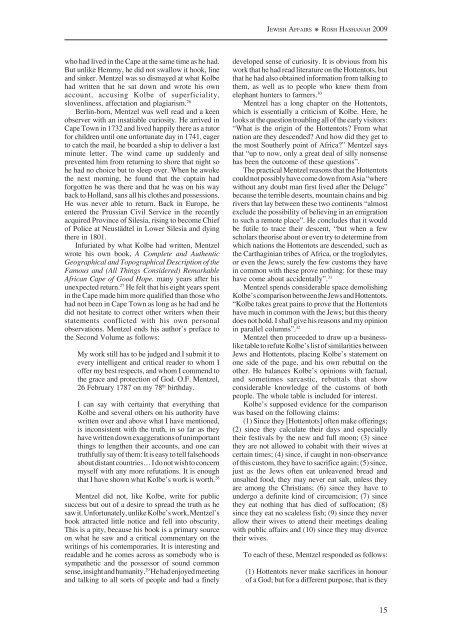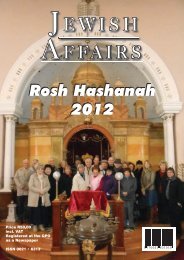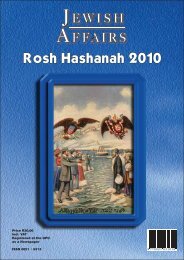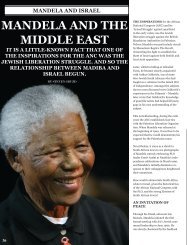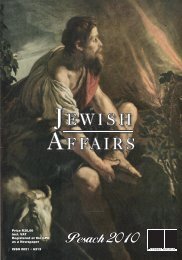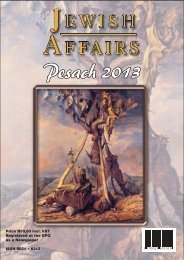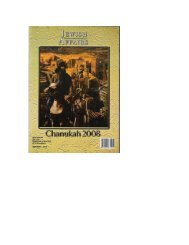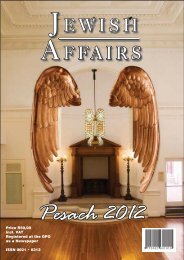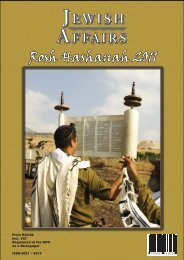Rosh Hashanah 2009 - South African Jewish Board of Deputies
Rosh Hashanah 2009 - South African Jewish Board of Deputies
Rosh Hashanah 2009 - South African Jewish Board of Deputies
- No tags were found...
Create successful ePaper yourself
Turn your PDF publications into a flip-book with our unique Google optimized e-Paper software.
JEWISH AFFAIRS ROSH HASHANAH <strong>2009</strong>who had lived in the Cape at the same time as he had.But unlike Hemmy, he did not swallow it hook, lineand sinker. Mentzel was so dismayed at what Kolbehad written that he sat down and wrote his ownaccount, accusing Kolbe <strong>of</strong> superficiality,slovenliness, affectation and plagiarism. 26Berlin-born, Mentzel was well read and a keenobserver with an insatiable curiosity. He arrived inCape Town in 1732 and lived happily there as a tutorfor children until one unfortunate day in 1741, eagerto catch the mail, he boarded a ship to deliver a lastminute letter. The wind came up suddenly andprevented him from returning to shore that night sohe had no choice but to sleep over. When he awokethe next morning, he found that the captain hadforgotten he was there and that he was on his wayback to Holland, sans all his clothes and possessions.He was never able to return. Back in Europe, heentered the Prussian Civil Service in the recentlyacquired Province <strong>of</strong> Silesia, rising to become Chief<strong>of</strong> Police at Neustädtel in Lower Silesia and dyingthere in 1801.Infuriated by what Kolbe had written, Mentzelwrote his own book, A Complete and AuthenticGeographical and Topographical Description <strong>of</strong> theFamous and (All Things Considered) Remarkable<strong>African</strong> Cape <strong>of</strong> Good Hope. many years after hisunexpected return. 27 He felt that his eight years spentin the Cape made him more qualified than those whohad not been in Cape Town as long as he had and hedid not hesitate to correct other writers when theirstatements conflicted with his own personalobservations. Mentzel ends his author’s preface tothe Second Volume as follows:My work still has to be judged and I submit it toevery intelligent and critical reader to whom I<strong>of</strong>fer my best respects, and whom I commend tothe grace and protection <strong>of</strong> God. O.F. Mentzel,26 February 1787 on my 78 th birthday.I can say with certainty that everything thatKolbe and several others on his authority havewritten over and above what I have mentioned,is inconsistent with the truth, in so far as theyhave written down exaggerations <strong>of</strong> unimportantthings to lengthen their accounts, and one cantruthfully say <strong>of</strong> them: It is easy to tell falsehoodsabout distant countries… I do not wish to concernmyself with any more refutations. It is enoughthat I have shown what Kolbe’s work is worth. 28Mentzel did not, like Kolbe, write for publicsuccess but out <strong>of</strong> a desire to spread the truth as hesaw it. Unfortunately, unlike Kolbe’s work, Mentzel’sbook attracted little notice and fell into obscurity.This is a pity, because his book is a primary sourceon what he saw and a critical commentary on thewritings <strong>of</strong> his contemporaries. It is interesting andreadable and he comes across as somebody who issympathetic and the possessor <strong>of</strong> sound commonsense, insight and humanity. 29 He had enjoyed meetingand talking to all sorts <strong>of</strong> people and had a finelydeveloped sense <strong>of</strong> curiosity. It is obvious from hiswork that he had read literature on the Hottentots, butthat he had also obtained information from talking tothem, as well as to people who knew them fromelephant hunters to farmers. 30Mentzel has a long chapter on the Hottentots,which is essentially a criticism <strong>of</strong> Kolbe. Here, helooks at the question troubling all <strong>of</strong> the early visitors:“What is the origin <strong>of</strong> the Hottentots? From whatnation are they descended? And how did they get tothe most <strong>South</strong>erly point <strong>of</strong> Africa?” Mentzel saysthat “up to now, only a great deal <strong>of</strong> silly nonsensehas been the outcome <strong>of</strong> these questions”.The practical Mentzel reasons that the Hottentotscould not possibly have come down from Asia “wherewithout any doubt man first lived after the Deluge”because the terrible deserts, mountain chains and bigrivers that lay between these two continents “almostexclude the possibility <strong>of</strong> believing in an emigrationto such a remote place”. He concludes that it wouldbe futile to trace their descent, “but when a fewscholars theorise about or even try to determine fromwhich nations the Hottentots are descended, such asthe Carthaginian tribes <strong>of</strong> Africa, or the troglodytes,or even the Jews; surely the few customs they havein common with these prove nothing: for these mayhave come about accidentally”. 31Mentzel spends considerable space demolishingKolbe’s comparison between the Jews and Hottentots.“Kolbe takes great pains to prove that the Hottentotshave much in common with the Jews; but this theorydoes not hold. I shall give his reasons and my opinionin parallel columns”. 32Mentzel then proceeded to draw up a businessliketable to refute Kolbe’s list <strong>of</strong> similarities betweenJews and Hottentots, placing Kolbe’s statement onone side <strong>of</strong> the page, and his own rebuttal on theother. He balances Kolbe’s opinions with factual,and sometimes sarcastic, rebuttals that showconsiderable knowledge <strong>of</strong> the customs <strong>of</strong> bothpeople. The whole table is included for interest.Kolbe’s supposed evidence for the comparisonwas based on the following claims:(1) Since they [Hottentots] <strong>of</strong>ten make <strong>of</strong>ferings;(2) since they calculate their days and especiallytheir festivals by the new and full moon; (3) sincethey are not allowed to cohabit with their wives atcertain times; (4) since, if caught in non-observance<strong>of</strong> this custom, they have to sacrifice again; (5) since,just as the Jews <strong>of</strong>ten eat unleavened bread andunsalted food, they may never eat salt, unless theyare among the Christians; (6) since they have toundergo a definite kind <strong>of</strong> circumcision; (7) sincethey eat nothing that has died <strong>of</strong> suffocation; (8)since they eat no scaleless fish; (9) since they neverallow their wives to attend their meetings dealingwith public affairs and (10) since they may divorcetheir wives.To each <strong>of</strong> these, Mentzel responded as follows:(1) Hottentots never make sacrifices in honour<strong>of</strong> a God; but for a different purpose, that is they15


